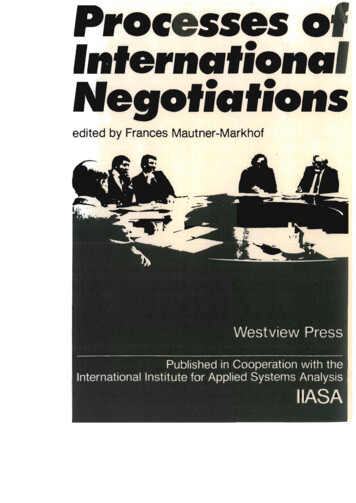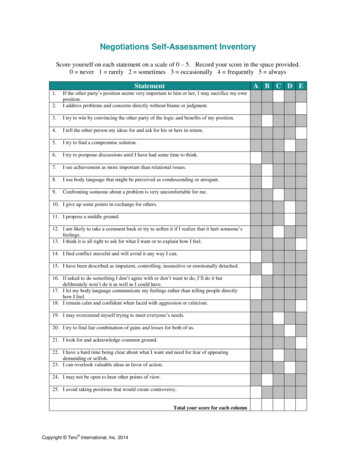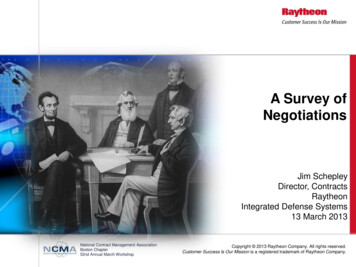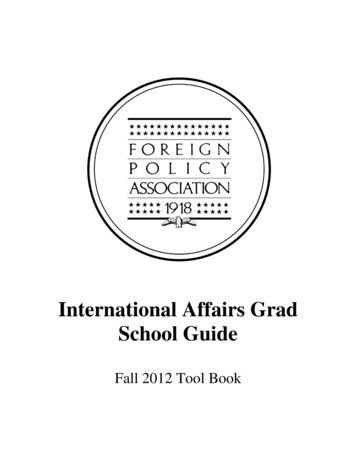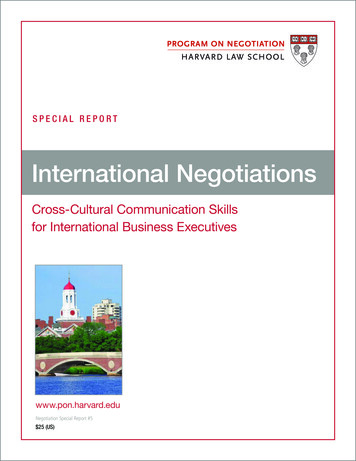
Transcription
SPECIAL REPORTInternational NegotiationsCross-Cultural Communication Skillsfor International Business Executiveswww.pon.harvard.eduNegotiation Special Report #5 25 (US)
Negotiation Editorial BoardBoard members are leading negotiationfaculty, researchers, and consultantsaffiliated with the Program onNegotiation at Harvard Law School.Max H. BazermanHarvard Business SchoolIris BohnetKennedy School of Government,Harvard UniversityRobert C. BordoneHarvard Law SchoolJohn S. HammondJohn S. Hammond & AssociatesDeborah M. KolbSimmons School of ManagementDavid LaxLax Sebenius, LLCRobert MnookinHarvard Law SchoolBruce PattonVantage Partners, LLCJeswald SalacuseThe Fletcher School of Law and Diplomacy,Tufts UniversityAbout NegotiationThe articles in this Special Report were previously published in Negotiation,a monthly newsletter for leaders and business professionals in every field.Negotiation is published by the Program on Negotiation at Harvard Law School, aninterdisciplinary consortium that works to connect rigorous research and scholarshipon negotiation and dispute resolution with a deep understanding of practice. For moreinformation about the Program on Negotiation, our Executive Training programs, andthe Negotiation newsletter, please visit www.pon.harvard.edu.To order additional copies of this Special Report for group distribution, or to ordergroup subscriptions to the Negotiation newsletter, please call 1 800-391-8629 or 1 301-528-2676, or write to negotiation@law.harvard.edu.For individual subscriptions to the Negotiation newsletter, please visitwww.pon.harvard.edu/negotiation-monthly.To order the full text of these articles, call 1 800-391-8629 or 1 301-528-2676,or write to negotiation@law.harvard.edu. Visit www.pon.harvard.edu to download otherfree Negotiation Special Reports.James SebeniusHarvard Business SchoolGuhan SubramanianHarvard Law School andHarvard Business SchoolLawrence SusskindMassachusetts Institute of Technologythree-Day seminarsthe charles hotelcambriDge, maMichael WheelerHarvard Business SchoolNegotiation Editorial StaffAcademic EditorGuhan SubramanianJoseph Flom Professor of Law andBusiness, Harvard Law SchoolDouglas Weaver Professor ofBusiness Law, Harvard BusinessSchoolEditorKatherine ShonkArt DirectorHeather DerochernegotiationanD leaDershiPDealing with Difficult PeoPleanD Problemsbecoming a better negotiator starts herethirty years of groundbreaking research, compressed into threethought-provoking days.Day 1: Discover a framework for thinking about negotiation success.Published byProgram on NegotiationHarvard Law SchoolDay 2: Examine and develop effective techniques for addressing a variety ofnegotiation challenges.Managing DirectorDay 3: Put it all together and emerge well equipped to negotiate more skillfully,confidently, and effectively.Susan HackleyAssistant DirectorJames KerwinCopyright 2012 by Harvard University.This publication may not be reproduced inpart or whole without the express written permission of the Program on Negotiation. Youmay not forward this document electronically.to register online or to download the free Program guide go towww.executive.pon.harvard.edu
PRO GR A M ON N E G O T I AT IONCope with culture clashesEntering the Soho Grand Hotel lobby in his most conservative suit, Stanbrimmed with confidence as he approached an important potential customer,Vice President Sugimoto of MTV-Japan. Spotting the stylishly attired Sugimotochatting with some musicians, Stan approached him with a deep bow andtraditional Japanese greetings of respect. When he heard Sugimoto’s reply—“What’s up with that, my man?”—Stan felt a sinking sensation in his gut.As Stan understood in hindsight, he needlessly raised cultural barriersbetween himself and Sugimoto that night. He should have realized—based onSugimoto’s employer, his hotel choice, and even his clothes—that his awkwardattempt at traditional Japanese manners would only embarrass his guest.Most of us can identify with Stan’s faux pas. In our era of diversity andglobalization, respect for cultural differences is constantly stressed. Yet ourcounterparts are complex people who won’t necessarily follow their culturalscripts. Sometimes culture matters a lot, sometimes not at all!When making judgment calls, we rely on schemas: cognitive templates thatprovide low-effort, ready-made answers. Cultural schemas account for thedistinctive behavioral biases exhibited by negotiators from a particular culture.Suppose that a buyer in a procurement negotiation is surprised by a new seller’shigh initial bid. She may wonder, “Is this seller trying to gouge me, or doeshis product require a high bottom line?” A core American cultural schemaattributes behavior to personality traits (as in the saying “Character is destiny”).If she follows this schema, she will interpret the seller’s bid in terms of personalfactors (the seller’s greed) rather than in terms of situational factors (the seller’sbargaining position).Deadlines, distractions, emotional stressors, accountability—all these factorsmake negotiators more likely to rely on cultural schemas rather than consideringa problem from multiple angles. An understanding of these triggering factorsTo subscribe to Negotiation, call 1 800-391-8629, write to negotiation@law.harvard.edu, or visit www.pon.harvard.edu.1
PRO GR A M ON N E G O T I AT IONcan help you cope with culture at the bargaining table.For instance, it can enable you to anticipate the extent to which culture willshape your counterpart’s behavior. And it can do more than predict behavior,it can help you influence it. You can shape many features of the negotiation inadvance—the location, the members of your team, the issues on the agenda,and so on—so as to reduce the possibility of cultural misunderstanding. In yourbehavior at the bargaining table, you can also work to minimize demands onyour attention, emotional stressors, and cognitive cues that provoke culturallybased thinking.Consider the case of a manager who was negotiating a joint venturebetween his Silicon Valley firm and a major Japanese electronics company.Communication and trust had disintegrated, and meetings in San Jose andTokyo had failed to restore a common understanding. In both settings, thevisitors felt off-guard and defensive, while the hosts were surrounded bydistractions and cultural primes. So the two sides decided to meet at a Hawaiianresort, a halfway point geographically and in other ways as well. Though withinthe United States, the resort catered primarily to Japanese tourists. The primarylanguage was English, but the ambiance was as much Asian as American. In thissetting, cultural barriers diminished, and trust was restored.Adapted from “When Culture Counts—and When It Doesn’t,”by Michael W. Morris (professor, Columbia University),first published in the Negotiation newsletter (June 2005).Weigh culture against otherimportant factorsAs members of organizations and families, we all know from experience thateven people with identical backgrounds can have vastly differing negotiatingstyles and values. Nonetheless, we continue to be intrigued by the idea thatdistinct patterns emerge between negotiators from different cultures.Researchers do confirm a relationship between national culture andnegotiation style and success. An ongoing project sponsored by Northwestern2To subscribe to Negotiation, call 1 800-391-8629, write to negotiation@law.harvard.edu, or visit www.pon.harvard.edu.
PRO GR A M ON N E G O T I AT IONUniversity’s Dispute Resolution Research Center is exploring the link betweenprocess and outcomes—specifically, how cultural tendencies lead to certainprocess choices, which, in turn, can lead to better or worse negotiation results.One study undertaken by the center has found that negotiators from the UnitedStates typically communicate their priorities more directly than do their Japanesecounterparts, an advantage at the bargaining table. Because Japanese negotiatorsare generally good at making inferences, however, they match the performance ofAmericans in their ability to use information to generate joint gains.By contrast, negotiators from Hong Kong and Russia do not create as muchvalue as do American and Japanese negotiators, though for quite different reasons.Hong Kong negotiators often fail to share enough information to identify beneficialtradeoffs, while Russian negotiators tend to rely too much on power tactics.Although the findings confirm some familiar national stereotypes, it would be agrave mistake to assume that group tendencies reliably predict any one individual’sbehavior. The important contribution of this research is that cultural differencesin negotiation don’t hinge precisely on where a negotiator happens to have beenborn. Rather, they depend on what that negotiator actually does at the bargainingtable. The ability to engage in constructive communication—by revealing andinterpreting information—matters much more than a negotiator’s passport.Adapted from “Cultural Notes,” first published in the Negotiation newsletter (April 2004).Prepare for possible cultural barriersEven with a common language and the best of intentions, negotiators fromdifferent cultures face special challenges. Try following these guidelines whenpreparing for talks with someone from a different culture:1. Research your counterpart’s background and experience. With a littlehomework, you should be able to learn who your negotiating partner will be andfind out some details about her background and experience. If your counterparthas a great deal of international negotiating experience, you can probably assumethat cultural stereotyping (and any effort to modify your negotiating strategyTo subscribe to Negotiation, call 1 800-391-8629, write to negotiation@law.harvard.edu, or visit www.pon.harvard.edu.3
PRO GR A M ON N E G O T I AT IONaccordingly) is likely to create new communication difficulties rather than solveold ones. If you have trouble getting information about your negotiating partner,ask an intermediary with contacts at that firm or organization to make inquiriesfor you. (Be sure the intermediary understands that he is not authorized to makeany commitments on your behalf.)2. Enlist an adviser from your counterpart’s culture. If you discover that theperson with whom you are likely to be negotiating has little or no internationalor cross-cultural experience, consider enlisting someone from his culture toserve as your “second” during the negotiation. Rather than deferring to thisadviser during talks, plan out signals in advance to indicate when you shouldtake a break for additional advice. In this manner, your cultural “guide” can helpyou size up the situation, coach you as needed, and even interject if he feels youhave made an egregious error or misinterpretation.3. Pay close attention to unfolding negotiation dynamics. Listen carefully duringtalks. If you’re unsatisfied with the answers you receive, reframe your questionsand try again. If you’re unsure about what the other side said, repeat what youthink you heard. It’s safe to assume that people living and working in differentcultural settings often view or interpret the same events differently. But in our eraof globalization, it’s also true that we have more in common on the person-toperson level than you might expect. Don’t ignore your intuition, and mind yourmanners.Most business professionals recognize when they need technical or legalexpertise to proceed with a deal-making interaction. Similarly, cross-culturalnegotiators should realize that they might well need help sizing up the situationin advance, as well as interpreting the signals and norms that could make orbreak a negotiation in a cross-cultural context.Adapted from “What Gets Lost in Translation,”by Lawrence Susskind (professor, Massachusetts Institute of Technology),first published in the Negotiation newsletter (September, 2004).4To subscribe to Negotiation, call 1 800-391-8629, write to negotiation@law.harvard.edu, or visit www.pon.harvard.edu.
PRO GR A M ON N E G O T I AT IONDeal with translators“The language of international business,” a British executive once said to me, “isbroken English.” Fortunately for American negotiators, who usually don’t speak aforeign language well, if at all, much of global business is conducted in English—an English with a profusion of accents, cadences, and syntaxes.Because translation complicates negotiation, executives should manage andplan for it as they would any other tactical element in dealmaking. Based on hisbook The Global Negotiator: Making, Managing, and Mending Deals Around theWorld in the Twenty-First Century (Palgrave Macmillan, 2003), Jeswald Salacusehas developed some simple rules that can help you negotiate more effectively intranslation, four of which we summarize here.1. Hire your own translator, and make your choice carefully. Except in caseswhere special reasons for trust exist, such as when you’re negotiating with alongtime partner, do not rely on the other side’s interpreter unless someoneon your team understands the language and can check the translation. Beforehiring an interpreter, try to determine her skill and experience from independentsources, such as the U.S. consulate or the local branch of a multinational bank. Inmany countries, the linguistic ability of people who call themselves “professionalinterpreters” varies considerably.Hiring a mediocre interpreter can wreak unintentional havoc. Several yearsago, an American negotiating team in China was astounded when its simplerequest to bring three typewriters into the country was rejected by governmentofficials on the other side of the table. Only after an hour of wrangling didit become clear that the interpreter had mistranslated the English word“typewriter” as the Chinese word “stenographer.”2. Brief your translator before negotiations start. Translators may be expertsin languages, but they will rarely be experts in your business. Cont
05.08.2012 · Negotiation is published by the Program on Negotiation at Harvard Law School, an interdisciplinary consortium that works to connect rigorous research and scholarship on negotiation and dispute resolution with a deep understanding of practice. For more information about the Program on Negotiation, our Executive Training programs, and
